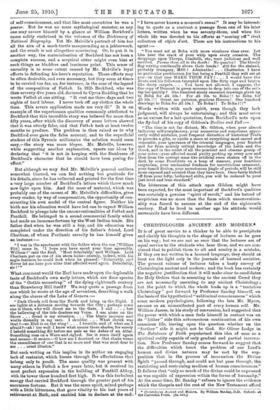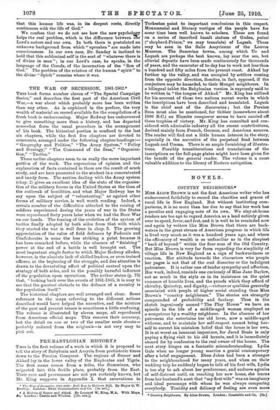CHRISTOLOGIES ANCIENT AND MODERN.*
IT is of great service to a thinker to be able to precipitate and clarify his thoughts in the shape of lectures as be goes on his way; but we are not so sure that the lectures are of equal service to the students who hear them, and we are con- vinced that to publish them to all and sundry is a mistake. If they are not written in a learned language, they should at least see the light only in the journals of learned societies. The present volume of lectures takes a hasty survey of Christologies ancient and modern; and the book has certainly the negative justification that it will make clear to candidates for Holy Orders that in assenting to the ancient Creed they are not necessarily assenting to any ancient Christology ; but the point to which the whole leads up is a " tentative Chriatology " put forward by Professor Sanday himself, on the basis of the hypothetical " subliminal consciousness " which some modern psychologists, following the late Mr. Myers, assume as an unmeeifested part of every human self. Mr. William James, in his study of conversion, had suggested that the power with which a man feels himself in contact was on its " hither " side this subconscious continuation of his own conscious life, leaving open the question whether on the " further " side it might not be God. Sir Oliver Lodge in The Substance of Faith popularised this idea of man as a spiritual entity capable of only gradual and partial incarna- tion. Now Professor Sanday comes forward to suggest that the difficulties which beset the problem of our Lord's human and divine natures may be met by the sup- position that in the process of incarnation the Divine Spirit "passed through, and could not but pass through, the restricting and restraining medium of human consciousness." It follows that "only so much of the divine could be expressed as was capable of expression within the forms of humanity." At the same time, Dr. Sanday " refuses to ignore the evidence which the Gospels and the rest of the New Testament afford • Christologies Ancient and Modem. By William Madan D.D. Oxford: at the Clarendon Press. [6e. net.]
that this human life was, in its deepest roots, directly continuous with the life of God."
We confess that we do not see how the new psychol helps the real problem, which is the difference between o r Lord's nature and our own. In both there is postulated an unknown background from which " nprushes " are made into consciousness. In our own case, Dr. Sanday is inclined to bold that this subliminal self is the seat of "whatever there is of divine in man " ; in our Lord's case, he speaks, in the language of the Creeds, of the incarnation of the "Son of God." The problem of the relation of the human " spirit" to the divine " Spirit" remains where it was.























































 Previous page
Previous page